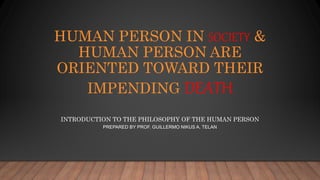
Human person in society & death
- 1. HUMAN PERSON IN SOCIETY & HUMAN PERSON ARE ORIENTED TOWARD THEIR IMPENDING DEATH INTRODUCTION TO THE PHILOSOPHY OF THE HUMAN PERSON PREPARED BY PROF. GUILLERMO NIKUS A. TELAN
- 2. CONTINUATION.. Forms of Societies 1. Medieval Period (500-1500 CE) - Feudalism- a way of life - Church was the strongest single influence in Europe Center is FAITH (St. Anselm : I do not seek insight of Reason in order to believe. I believe in order to gain insight) - FAITH & REASON
- 3. CONTINUATION.. Forms of Societies 2. Modern Period (1500-1800 CE) - Modern Philosophy-attack on the rejection of Middle Age - Protestant ethic & modern capitalism - Experimentation, observation & application of Math & science set the standards for philosophic inquiry. - rationalism- view that "regards reason as the chief source and test of knowledge" - naturalism- "idea or belief that only natural (as opposed to supernatural or spiritual) laws and forces operate in the world."
- 4. CONTINUATION.. Forms of Societies 2. Modern Period (1500-1800 CE) - Age of Empiricism-the view that the origin of all knowledge is sense experience and sensory perception) - Humanism- prefers critical thinking and evidence (rationalism, empiricism) over acceptance of dogma or superstition Critical Idealism- humanity's nature is the real creator of humanity's world
- 5. CONTINUATION.. Forms of Societies 3. GLOBALIZATION & TECHNOLOGICAL INNOVATIONS -multilateral interactions among global system - Introduction to invention- Industrial Revolution - IR-changed people’s way of life - AI-Artificial Intelligence-smarter than people - The science & engineering of making intelligent machines - Society is influenced by technology
- 6. CONTINUATION.. Forms of Societies 3. GLOBALIZATION & TECHNOLOGICAL INNOVATIONS Modern technology has sacrificed humanity & world together leading to their destruction Science & Technology is not a single phenomenon. On the Other hand they have become ideology
- 7. Martin Heidegger Heidegger begins "The Question Concerning Technology" by examining the relationship between humans and technology, a relationship Heidegger calls a "free relationship". If this relationship is free, it "opens our human existence to the essence of technology". This essence of technology, however, has nothing to do with technology. Rather, as Heidegger suggests, "the essence of a thing is considered to be what the thing is". Heidegger examines two definitions of technology. Firstly, he offers that "technology is a means to an end". Secondly, he proposes that "technology is a human activity"
- 8. HUMAN PERSON ARE ORIENTED TOWARD THEIR IMPENDING DEATH
- 9. HUMAN PERSON ARE ORIENTED TOWARD THEIR IMPENDING DEATH
- 10. SOCRATES -research & teaching (work of the school) -2 different ways of teaching: a. Expository method- answers the students direct or implied question( fills the void ignorance w/ info) b. Socratic Method (tutorial) – to assess by question & to set him problems (reduce, criticize the solutions)
- 12. PLATO Contemplation Is very important in life of humanity because this is only available means for man to be free of his space confinement- truth
- 13. PLATO Is the source of endless trouble to us. - Causes us turmoil & confusion of inquiries. - To see the TRUTH we must quit the body DEATH - PURE KNOWLEDGE
- 14. ARISTOTLE Realizing Your Potential
- 15. death involves reflection on its significance in one's life thinking about the larger values that give life its meaning in the end death only to the point that it frees us death show us our living fears Death and its concept are absolutely empty. No picture comes to mind.
- 16. The fear of death follows from the fear of life. A man who lives fully is prepared to die at any time.
